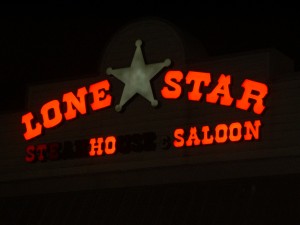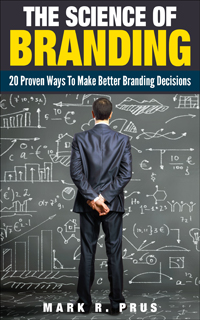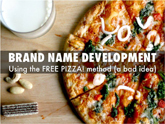Marketing
What Happens When A Few Lights Go Out?
This falls into the category of "you can't think of everything when naming…can you?"

Something that will crack me up and usually leave others staring at me is what store signage can spell when the bulbs in some of the letters in the names have burnt out. My personal favorite is from a Lone Star Steakhouse and Saloon where somehow the only letters that remained from “Steakhouse and Saloon” were “HO SALOON.” No comments please from people who work at Lone Star as I am not implicating anyone; just thought it was funny!
I’m not saying that you need to evaluate all possible scenarios for burnt out letters in your storefront name—but let’s just say that you might want to keep a large supply of extra light bulbs on hand and check your exterior signage frequently!
Lessons in Branding From Anti Monkey Butt Powder
A few weeks ago I posted a Twitter Poll (Follow me @NameFlash) to gather opinions on Anti Monkey Butt Powder…Good Name or Bad Name? The results indicated that about 70% of people thought Anti Monkey Butt Powder was a bad name.
However, the real learning came from the comments I received about the post. The people who thought it was a bad name were making fun of the name and talking about how they would never buy such a product. The people who thought it was a good name were people who suffered from what might be described as a “chafed butt” due to extended horseback riding, motorcycle riding, or truck driving. Some of the people who responders were actual consumers of the product and were very defensive about the name—they thought it was perfect!
Naming Confusion
 So the owners of this store probably think they have a terrific name for their business: “Kids Exchange.” Well I beg to differ. First of all, what is a kids exchange, anyway? What do you do here? Swap your kids out when you get tired of them or turn them in for cash like those gold-buying places that seem to be cropping up everywhere? A naming professional could have helped prevent this confusion.
So the owners of this store probably think they have a terrific name for their business: “Kids Exchange.” Well I beg to differ. First of all, what is a kids exchange, anyway? What do you do here? Swap your kids out when you get tired of them or turn them in for cash like those gold-buying places that seem to be cropping up everywhere? A naming professional could have helped prevent this confusion.
However, this picture goes one step further—why did they not put a space between the words “Kids” and “Exchange”? Proper capitalization would have been helpful as well. Not sure why this is a problem? Look at it a bit more closely…there it is. These 12 letters could just as easily spell…Kid Sex Change. I don’t think that’s what the store is about, but who am I to judge? Either way, it’s obvious that not only the name, but also the logo and signage could have benefited from professional help.
You Should Always Check International Communication of Your Name, or Risk This!
The photo below pretty much says it all.
 Assitalia is one of the biggest insurance companies in Italy. I am sure the company developed its name without thinking about international considerations. In Italy, the name is probably fine. But if they ever wanted to expand to an English speaking country…well, let’s just say there might be a problem.
Assitalia is one of the biggest insurance companies in Italy. I am sure the company developed its name without thinking about international considerations. In Italy, the name is probably fine. But if they ever wanted to expand to an English speaking country…well, let’s just say there might be a problem.
Most companies for which I develop names for insist that I do some sort of name verification to ensure that the names I develop have no problematic connotations in the major foreign languages. Clearly, Assitalia never thought of that!
Is Xmas A Suitable Name for Christmas?
During this time of year you see a lot of use of Xmas as a substitute for Christmas. Now I will stay out of the religious debate that claims Xmas is the work of the devil because it essentially “X”s out Christ. While there are some references that indicate X was a substitute for Christ as far back as the 15th century, there does not appear to be any evil intent. Words such as Xian for Christian and Xmas for Christmas were commonly used as abbreviations to cut down the printing cost. Most derivations of Xmas come from “X representing the Greek letter Chi” the first letter in Χριστός (Christos) “Christ.”
Nevertheless, why do we use Xmas?
The Single Most Important Marketing Effort For Your Product
In the spring of 1971, a new marketing idea was hatched. Today, over 38 years later, the idea is still the most important thing you can do to achieve marketing success.
In an ad in the April 7, 1971 New York Times, David Ogilvy outlined his 38 points for creating “advertising that sells.” He called the #1 item on the list “the most important decision.” He went on to say that “the results of your campaign depend less on how we write your advertising than on how your product is positioned.”
His message was clear…you need to start with a clear positioning for your product. With a clear positioning, you can establish your marketing territory versus your competitors. Without a clear positioning, you will forever struggle to establish your marketing message.
To Google® Or Not To Google®
Full disclosure…I own Google stock. I like their products and their potential. However, I am more than a bit concerned about how they use their names and trademarks.
Microsoft® names its products in a traditional fashion. Microsoft is the company; names like Windows, Silverlight, Bing are clearly the products. A very logical naming architecture that makes it clear where the company ends and the product begins.
Google is a company and a trademark for several goods and services. The Google trademark is perhaps best know for “Search engine services” (International Class 042) but Google can also be “Dissemination of advertising for others via the Internet” (IC 035) or “Telecommunication services” (IC 038) or “Financial services” (IC 036) or any of a number of different product or service ideas that carry the name Google.
How David Can Beat Goliath
How David Can Beat Goliath in Naming OTC Medicines
After 25+ years in the highly competitive world of OTC medicines, I’ve learned some things about naming products. One thing I’ve learned is you have to understand the “Goliaths” of the category and zig when they zag.
Many OTC categories are dominated by brands that have been building equity for 50+ years. Brands like TUMS® (75+ years) and Bayer® Aspirin (100+ years) are Goliaths because they are well positioned, satisfy consumer needs, and have had consistent marketing support. Should you study these historical successes? You bet. People buy these brands for a reason. Find it. Exploit it if you can with a name of your own.
Another Goliath is the constant influx of new Rx-To-OTC switches. Brands like Advil® (introduced 1984), Claritin® (1993) and Prilosec® OTC (2003) are “switch Goliaths” that turned categories upside down.



